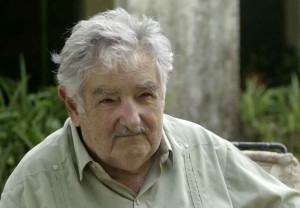Editor’s note: Cannabist editor Ricardo Baca spent a week in Montevideo, Uruguay, in August 2014 while reporting on the country’s first-of-its-kind federal marijuana legalization and regulation. Keep up with The Cannabist’s Uruguay reporting, along with Baca’s series, here.
Montevideo, Uruguay — There’s a revolution happening in the streets of this sleepy South American capital — one full of controversial landmines, landmark precedents and intense international heat.
It’s the kind of uprising you can smell, and it’s a familiar scent in Colorado.
Marijuana is on the lips and minds of many Uruguayans. While the possession of cannabis has been federally legal here since 1974, the government’s recent effort to regulate the sale of recreational marijuana has thrust the quiet, modest country of 3.3 million into the international limelight.
In the coming months, Uruguay will be the only country in the world with legal, regulated recreational marijuana sales, and President José Mujica — who donates 80-90 percent of his salary to the poor and opts to live at his semi-rural flower farm instead of the opulent, more traditional presidential palace — is at the center of the lively national conversation.

“The political decision to go from total prohibition to regulation happened entirely due to the fact that Uruguay’s president today is José Mujica,” said Julio Calzada, secretary general of Uruguay’s National Drug Council.
In his five-year term, President Mujica has overseen the legalization of same-sex marriage and abortion and created a regulated marijuana market, igniting passionate youths to activism and alienating much of Montevideo’s wealthy elite. It’s a bold track record, especially considering that multiple polls showed only 27 percent of Uruguayans supporting the marijuana measures.
Adding to Mujica’s precarious social reform: Uruguay is less than 30 years removed from a military dictatorship that rocked the country and caused many loyal Uruguayans (Mujica included) to join rebel forces fighting the dictators. Is this modern liberal enlightenment a direct, if decades-later reaction to life under a dictator?
“You know the song ‘Time is on My Side’?” Diego Cánepa, the charismatic president of Uruguay’s National Drug Council, asked. “Well in this discussion time is on our side.
“It’s a matter of time. When the American government changes, this is what happens a few years later: The rest of the world changes, too. So in 10 years there will not be an issue of marijuana. We will have other issues that are more important than marijuana.”
But will Mujica’s system, designed by Calzada, Cánepa and their staffs, reach implementation amid the country’s upcoming elections in October? Even though Uruguay’s next president will take office in February 2015, Mujica’s party — the broadly favored Frente Amplio represented by presidential candidate (and former Uruguayan president) Tabaré Vázquez in October’s big election — is confident its work on the cannabis issue will continue regardless of who is elected.
The multi-headed opposition says it will absolutely change Mujica’s cannabis law, for better or worse.
“I don’t believe in our (marijuana) law here,” said Luis Lacalle Pou, the handsome presidential candidate for the Partido Nacional party and son of former Uruguayan President Luis Alberto Lacalle, during a brief break from campaigning. “I don’t believe the state should be regulating and selling (marijuana), and it shouldn’t be compulsory for pharmacies to sell it.”
Senator Alfredo Solari, a member of Partido Colorado, voted against Mujica’s cannabis plan and agrees that if his party wins the presidency things could change drastically.
“If there is a new administration,” Solari said, “we will see whether the law is implemented at all.”

So where exactly does Uruguay’s famous marijuana law stand? While it is law, delays have plagued its implementation as the government seeks the contractors who will grow marijuana on government-owned fields protected by state security forces.
Once there is enough cannabis to supply Uruguay’s 1,200 pharmacies, customers who are registered with the state can access their allotment of 40 grams per month. (Only Uruguayan citizens will have access to the legal weed — none for the Argentinian tourists flocking to Punta del Este’s beaches each summer.) Mujica’s colleagues estimate pot sales will start in December or January — but since nothing has yet been planted, that will likely make for another delay.
If locals don’t buy their marijuana at the pharmacy, they can either grow up to six plants at home or join a cannabis club, which allows the growth of 99 plants. And this is all recreational cannabis. A medical system will come next, and hemp regulations are being drafted simultaneously.
Some comparisons to put Uruguay and its cannabis system in perspective: Colorado’s population of 5.3 million dwarfs that of Uruguay’s 3.3 million. Uruguay’s system will allow residents the purchase of 40 grams per month, while Colorado’s allows the purchase of 28 grams (or 1 ounce) per day to locals. Uruguay won’t allow tourists to purchase cannabis but allows public marijuana smoking, while Colorado allows out-of-state customers to buy a lesser amount than locals but has banned public ingestion of any pot products.
Uruguay’s minimum age to partake is 18, and its weed’s maximum THC amount is 15 percent; Colorado requires those purchasing marijuana to be at least 21, and there is no maximum on the strength of the cannabis for sale. Uruguay’s system is state run, where the government hopes to price the cannabis at $1 per gram; In Colorado’s free market, marijuana costs anywhere from $8-$16 per gram.
“If I have to choose between the model of the black market and the model of Colorado, I choose the model of Colorado,” said Drug Council president Cánepa, who is as critical of Colorado’s medical marijuana system as his boss President Mujica is, chiefly because they suspect many of Colorado’s “patients” are not really ill. “And between the model of Colorado and the model of Uruguay, I choose the model of Uruguay.”
The thriving black market inspired both Uruguay and Colorado to legalize marijuana. But Mujica’s dedication to selling his recreational cannabis for $1 per gram — a controversial plan that has many wondering if farmers can mass produce cannabis that inexpensively — shows his seriousness on narco trafficking, his staff says.
“Mujica’s main concern are drug dealers,” said Lucia Topolansky, Mujica’s wife and a Uruguayan senator. “And while Uruguay is not a main destination (for these dealers), because we are few in numbers, it is a country of transit, and the problem exists.”
